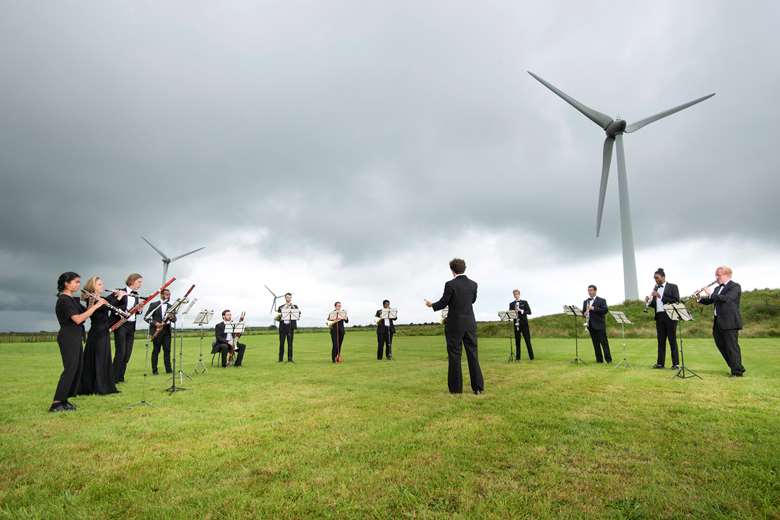John Warner on using music to advocate for our planet
John Warner
Tuesday, January 25, 2022
The Orchestra for the Earth founder discusses the emotional power of music in the battle against climate change.

Music has a long and successful history as a catalyst for social change. Live Aid is one of the most famous examples among many, but when I founded Orchestra for the Earth (OFE) in 2018, there were few classical music events and initiatives focussing on the climate crisis. This seemed to me a massive missed opportunity. Music inspires and unleashes the most extraordinary emotions in us, making us cry, laugh, and dance - even against our will. Few things in society wield that power and it is no wonder that it has, at certain points in time, been treated with suspicion and even fear. The toolbox of the climate movement is well stocked with powerful facts, images, and reasoning: why not add music to that, the one tool we possess with the ability to access the deepest recesses of the human heart and mind?
My aim in founding OFE was just that: to use music to share our love of the natural world and inspire others to value and protect it. The usual channels through which we learn about climate issues - documentaries, newspaper articles, podcasts - we experience alone. The result can feel utterly overwhelming, isolating, and paralysing - a feeling compounded by recent lockdowns. Concerts, on the other hand, are the opposite. They are shared spaces, chances to connect with other people, to socialise, to share ideas, to feel part of a community. We need such occasions now more than ever, not just for our own happiness but to allow us to see that we are not alone in worrying about the planet or in our efforts to protect it.
The core of OFE’s work is an annual concert tour of the Alps following in the footsteps of one of my favourite composers, Mahler, who spent every summer up in the mountains soaking up inspiration. The little huts where he shut himself away to put pen to paper still stand, surrounded by the same stunning mountains, lakes, and valleys he and many others treasured. Without these places, most of the music we know and love simply would not exist. Music has helped us build close relationships with the communities we encounter on our tour and our concerts have proved important stimuli for building cross-community support for environmental projects. On the shores of a lake just outside of Salzburg, where Mahler wrote the ‘Resurrection’ Symphony, we have worked with local landowners to establish a new nature reserve. We also run an annual children’s event in northern Italy (where he wrote The Song of the Earth), bringing together outdoor activities and music, inspiring the next generation to be custodians of these two critical aspects of their heritage.
Given our mission, an international tour may seem an odd centrepiece: touring is usually one of the most carbon-intensive activities in the music world. For us, it has been a chance to carve out a vision of how it can be done sustainably. We travel entirely by land, something we believe improves what we do as well as reducing the carbon footprint substantially. It’s far less tiring than flying and allows us to reach venues away from the ’airport circuit’ of major cities, most of which have perfectly good orchestras of their own. Instead, we visit smaller towns and villages where international musicians rarely pass through, and where we can get much closer to nature, too.
In the UK, we’ve experimented with a number of new concert formats, integrating our environmental message with the music we have to offer. We often collaborate with scientists, charities, and other artists to create integrated events that bring these things together in a meaningful way. One of the most striking is our annual Earth Hour concert, which we perform entirely by candlelight, creating an almost vigil-like occasion. This has proved a very effective fundraiser for WWF, but more important is the impression left on the audience: one of shared responsibility and the need for action. In the studio we’ve recorded music for campaigns such as HRH Prince Charles’s Terra Carta and the World Land Trust, the latter raising over £1m.
Reaching young audiences has been especially important. It’s these younger generations that often need the most convincing that classical music is interesting or relevant to them, so putting it in the context of climate change, an issue they care about more than anything else is an effective way of shifting opinions. The nature angle is a great reason to take these events into new and engaging spaces, such as the Eden Project’s giant Mediterranean Biome, where OFE and our young audience were surrounded by a dizzying array of plants and with birds singing overhead.
We are still in our early days, and I am excited for the projects to come. In the grand scheme of things, we are a small organisation fighting a big problem, but I believe our contribution is both effective and vital. I also feel no ownership over our mission and methods: I would be thrilled to see other orchestras doing the same. The chance to communicate and engage with audiences about climate change in a neutral forum like a concert, bonding over a shared love of music rather than fighting over politics, is a valuable one - a route to consensus. The cool rationalism of climate science is utterly essential, but we need to think emotionally as well, and that is what culture is for. It has been said that politics is downstream of culture, and I firmly believe that it is in the cultural sphere, not the political, that the struggle for a habitable planet will be won or lost.
You can find out more about Orchestra for the Earth here.

